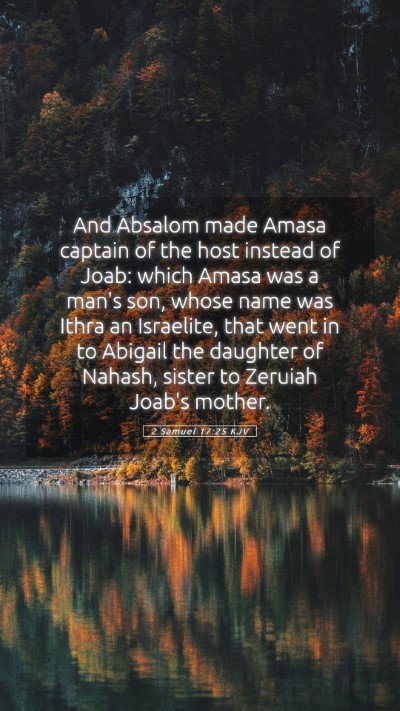Bible Verse Meaning: 2 Samuel 17:25
Verse Reference: 2 Samuel 17:25 - "And Absalom made Amasa captain of the host instead of Joab: which Amasa was a man's son whose name was Ithra, an Israelite, that went in to Abigail the daughter of Nahash, sister to Zeruiah, Joab's mother."
Understanding the Context
The passage is set during the reign of King David and it highlights a pivotal moment in Absalom's rebellion against his father. Amasa is appointed as the commander of Absalom’s forces, marking a significant shift in leadership during this tumultuous period in Israel’s history.
Commentary Insights
-
Matthew Henry's Commentary:
Henry emphasizes that the appointment of Amasa was politically motivated. Absalom sought to unify the kingdom's factions by appointing Amasa, who had ties to the north, as a strategic move. This illustrates Absalom's intent to bolster his position and gain broader support against David.
-
Albert Barnes' Notes:
Barnes observes the significance of Amasa's lineage, noting that his connection through Abigail links him to both David’s lineage and Joab’s military prowess. This duality serves to illustrate how Absalom attempted to consolidate power while still maintaining ties to David's established political structure.
-
Adam Clarke's Commentary:
Clarke suggests that Amasa’s appointment signifies a display of confidence from Absalom, but it also foreshadows potential conflicts, particularly between Joab and Amasa. Clarke sees this as a reflection of the larger moral and political decay during Absalom's rebellion.
Key Themes
This verse carries several important themes relevant to the understanding of the broader narrative:
- Leadership Changes: The verse underscores the impact of political decisions on leadership and loyalty.
- Conflict and Rivalry: The appointment of Amasa is a precursor to further conflict, highlighting the dangers of political maneuvering.
- Family Dynamics: The relationship between Absalom and David, and the implications of family bonds on leadership choices, are critical to understanding the narrative.
Applicational Insights
How does this verse apply to our lives today? Here are some insights:
- Decision Making: Just as Absalom made strategic decisions that affected many, we should carefully consider how our choices impact our families and communities.
- Unity vs. Division: The pursuit of unity, even in political settings, reflects a critical aspect of leadership that seeks the good of the whole rather than self-gain.
- Legacy and Influence: Acknowledging our family legacies can guide our decisions; understanding those influences can help us lead more effectively.
Related Bible Verses
For a deeper understanding, consider the following cross-references:
- 2 Samuel 15:10 - Absalom's plot to take the kingdom.
- 1 Chronicles 2:16 - Joab as a military leader and his family dynamics.
- 2 Samuel 19:13 - The consequences of the conflict between David and Absalom.
Conclusion
In conclusion, 2 Samuel 17:25 serves as a critical juncture in understanding the political and familial tensions during Absalom's rebellion. The insight from various commentaries provides a rich analysis that aids in grasping the complexity of leadership and the ramifications of choices made within familial and national contexts.
Further Study
For those engaging in deeper distillation of Scripture, consider these keywords in your study:
- Bible verse meanings
- Bible verse interpretations
- Bible study insights
- Understanding Scripture
Utilizing online Bible study tools and resources can enhance your understanding, especially in study groups or courses focused on biblical exegesis and historical context.


